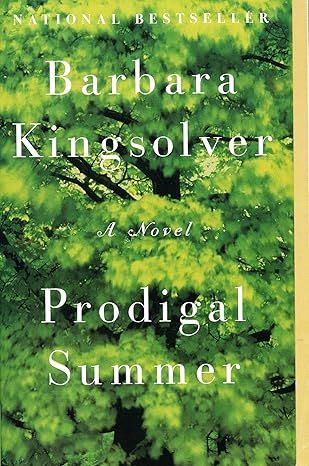Prodigal Summer: A Novel
4.4 out of 5
6,309 global ratings
National Bestseller
“A blend of breathtaking artistry, encyclopedic knowledge of the natural world. . . and ardent commitment to the supremacy of nature.” — San Francisco Chronicle
In this beautiful novel, Barbara Kingsolver, New York Times bestselling author of Demon Copperhead and The Poisonwood Bible, weaves together three stories of human love within a larger tapestry of lives inhabiting the forested mountains and struggling small farms of southern Appalachia.
Over the course of one humid summer, as the urge to procreate overtakes the lush countryside, this novel's intriguing protagonists—a reclusive wildlife biologist, a young farmer's wife marooned far from home, and a pair of elderly, feuding neighbors—face disparate predicaments but find connections to one another and to the flora and fauna with whom they necessarily share a place. Their discoveries are embedded inside countless intimate lessons of biology, the realities of small farming, and the final, urgent truth that humans are only one piece of life on earth.
464 pages,
Kindle
Audiobook
Hardcover
Paperback
Audio CD
First published October 15, 2001
ISBN 9780060959036
About the authors
Barbara Kingsolver
Barbara Kingsolver was born in 1955 and grew up in rural Kentucky. She earned degrees in biology from DePauw University and the University of Arizona, and has worked as a freelance writer and author since 1985. At various times she has lived in England, France, and the Canary Islands, and has worked in Europe, Africa, Asia, Mexico, and South America. She spent two decades in Tucson, Arizona, before moving to southwestern Virginia where she currently resides.
Her books, in order of publication, are: The Bean Trees (1988), Homeland (1989), Holding the Line: Women in the Great Arizona Mine Strike (1989), Animal Dreams (1990), Another America (1992), Pigs in Heaven (1993), High Tide in Tucson (1995), The Poisonwood Bible (1998), Prodigal Summer (2000), Small Wonder (2002), Last Stand: America's Virgin Lands, with photographer Annie Griffiths (2002), Animal, Vegetable, Miracle: A Year of Food Life (2007), The Lacuna (2009), Flight Behavior (2012), Unsheltered (2018), How To Fly (In 10,000 Easy Lessons) (2020), Demon Copperhead (2022), and coauthored with Lily Kingsolver, Coyote's Wild Home (2023). She served as editor for Best American Short Stories 2001.
Read more
Reviews
Nikki Douglas
5
Gorgeous writing, worth every word
Reviewed in the United States on April 27, 2015
Verified Purchase
Not many books I read get five stars. This does because it is a beautifully written book and because the stories are touching, small and deeply intimate. I read it like letters from an old friend, not wanting it to end and when it did, tearing up because the prose was so heart-felt and meaningful I knew I would miss the characters, knew I would miss the summer and would wish to hear from them again.
That's the best kind of book, where you feel a sense of loss at its completion. I just held my kindle, wiping my eyes and had to read the last few pages again because it affected me so powerfully to let go of these people and their stories. I loved them even though while I read the book there may have been things I didn't necessarily like about them.
The most touching story to me was Predator, the story of Forest Service game warden Deanna Wofle and her itinerant love interest Eddie Bondo (what a name). She's forty-seven years old, so lonely she doesn't even know it and meets twenty-eight year old, beautiful, masculine, sexy hunter Eddie Bondo in the forest and falls in love and lust in a way that terrifies her.
Their love scenes are worth the price of admission - I never read anything quite so pastorally erotic in my life. Wow, well done, Barbara Kingsolver. She's got some hidden sexy depths that's for sure. Stunningly gorgeous writing.
My next favorite story is Moth Love about a young woman coming to terms being part of a farming family as she is a stranger from the city and a stranger religiously and ethnically. It's a charming and emotionally heartfelt story of love, loss and yes, moths. The final pages choked me up.
The final story (they are all loosely intertwined) is Old Chestnuts about exactly that, two old folks fighting over trees, pesticides, organic farming and falling for each other in the process (it is so sweet and adorable to watch it unfold).
There is quite a bit of heavy-handed moralizing on farming, forestry, organic farming, even a bit on Christianity and animal welfare and that can get tiresome but read through it and let it mean something to you or not but do read through to get to the human elements of the story.
Funny thing in a pastoral that the humanity is what comes through the most.
This book will be with me forever, a part of me now, like every gorgeous summer.
Read more
29 people found this helpful
Frieda
5
Prodigal Summer
Reviewed in the United States on June 15, 2023
Verified Purchase
Although I happily give this book 5 Stars, seeing as that's all I'm allowed to give (!), I must say I am unhappy with the ending. It didn't end! None of the loose threads were gathered, much less tied! If I hadn't just seen the copyright date, I'd be hoping for a sequel, a part 2! I want to know how these 3 unrelated stories actually DO relate & how they come together!!
I loved the stories because I can see myself a little bit in all three. I could easily be Deanne, camped out alone in the forest with the birds & all the critters, & the majestic trees & beautiful shrubs & wildflowers! As are Garnette & Nannie, I'm getting older, but unlike them, unable to do the outdoor work I love. Like Lusa, I've had to take on the responsibilities of an absent spouse. Like all of them I live in Appalachia, & like most I was born & raised here. The country is in my blood. I can't tell you how many times I heard my Mama & Daddy speak in these pages! Phrases & dialect I haven't thought of in ages! A Petunia In An Onion Patch! Mama used to sing that to me when I was only 2 or 3! Hollows are Hollers around here, & one is named for my Grandaddy! Aunt IS pronounced Ain't! In so many ways, this story could have been my story. The woods surround my house. The changes that occur to a place over time. The changes that happen to people. But the beauty remains. God's in His Heaven & all's right with the World. Until it isn't. Again. Then it starts all over. "The thing that hath been, it is that which shall be; and that which is done is that which shall be done: and there is no new thing under the sun". Ecclesiastes1:9
Read more
6 people found this helpful
hoppergirl
5
I need more
Reviewed in the United States on June 5, 2024
Verified Purchase
Wonderfully written stories intertwined like the honeysvines on the mountain. I LOVE THE WORK OF THIS AUTHOr. Read this one and be amazed
Patti
5
breathtaking
Reviewed in the United States on June 29, 2024
Verified Purchase
these characters and descriptions of this mountain and farms will stay with me for a long time. Ms Kingsolver is a master teacher of the natural world thru story. Deeply touching, each of the key characters are fully formed and I felt like I knew them and could smell the seasons in the woods and hear the crickets and bird songs on the farms. Beautifully written, Prodigal Summer is yet another reason Ms Kingsolver is my favorite writer.
Read more
2 people found this helpful
Reader6647
5
Wonderful interwoven stories about Appalachian Life
Reviewed in the United States on July 17, 2022
Verified Purchase
I thoroughly enjoyed this book about farm life in the Appalachia. The stories start out as separate pieces, but then eventually start to intertwine just a little. There are a lot of other reviews that have done a great job summarizing the book so I am just going to leave some thoughts. I didn’t buy the Deanna and Eddie Bondo romance. The parts where she was having deep discussions with him about the importance of coyotes or when she was wondering the woods herself were so beautiful and detailed that I just loved getting lost in the book. However, I had a hard time believing that she would even want to be intimate with someone so against her personal beliefs. It did not make Eddie at all a very appealing person to me and it made me wonder how she could stand him being around. He was almost an intruder in my opinion and the story may have been more intriguing if he were. After Cole died, Lusa looks into putting together a goat herd to sell the meat to her family in New York City. I loved that Kingsolver had this character do something original. After having a long conversation about it with Little Rickie, you would think that she would need his help getting the goats. Instead, Kingsolver skipped over this and she just went and got the goats herself and it all seemed pretty seamless. It would have been interesting to hear more about the new challenges of raising goats; especially being an inexperienced farmer. I would have loved for Rickie to be 18 or 19 and Kingsolver blossoming that romance a little more. The introspective discussion after Eddie killed a turkey left me wishing I was there to say a few things. On page 325, Eddie kills a turkey in the woods. Deanna writes it off saying that it was a male and probably was old or sick enough that it would have made a meal for a bobcat or other predator on the mountain. Eddie teases her surprised she is not a vegetarian for all her talk about caring for the animals on the mountain. She says the concept of vegetarianism is not so simple, because to farm wheat a lot of animals get killed by the machinery. I know this is Kingsolver’s opinion being inserted here, but vegetarianism and veganism is not about purity, it’s about doing the least amount of harm in this world as possible. Much of the grains that are grown are to feed animals that are raised for meat. Less meat, less wheat, less mice and rabbits that are killed and probably more forests don’t need to be cut down. Also, earlier Deanna talks about cats being unnatural predators. I agree with this; however, in this discussion about the turkey, how are humans not also considered unnatural predators? Wasn’t she denying the bobcat or coyote a meal? The meditations on ecology, wildlife preservation, forests, and organic farming made me believe this was a better environmental novel than Overstory. I read Overstory and even though that book started out pretty good, it petered out for me as if the author got bored with the story and the characters. This book held my attention the entire time as if Kingsolver was in love with the story and all the details. This book deserved an award. Last, an epilogue would have been nice. I did not really like the last chapter of the book. I didn’t understand it. I would have loved instead for there to be an epilogue on what happens to these characters after ten years. If I could write it, Deanna and her daughter inherit Nannie Rawley’s farm and she continues to grow organic produce. Garnett’s grandchildren continue with the Chestnut farm and they achieve the beginnings of a grove that is free of Chestnut blight. Lusa and Rickie after a few years eventually do marry and start a family continuing the Widener name on the ancestral farm. I think the stories were all going in this direction, but it would have been nice to see the narratives through to the end.
Read more
19 people found this helpful
Amazon Customer
5
Love the nature and environmental theme
Reviewed in the United States on July 4, 2024
Verified Purchase
Barbara Kingsolver always delivers a beautifully written, compelling story. This one focuses on three relationships and how lives become entwined, while supporting the important message of how we need to protect our pollinators and environment, even in as we garden.
BklynGal
5
The book is lush with biological detail
Reviewed in the United States on November 24, 2023
Verified Purchase
I had cause to reread this novel many years after first reading it. The novel comprises three loosely intertwined story lines of three strong, eco-minded women all living in a rural, mountainous region of Virginia. Each story line is engaging, and each woman well portrayed. The book is lush with biological detail, drawing parallels between the biology of various species and human biology. This is the essence of much of Kingsolver’s writing and is somewhat of a trademark. This novel is particularly heavily seeped in biology/ecology, which is balanced with personal, human stories, but the biological “lessons” may become too prevalent for some readers.
Read more
2 people found this helpful
J. Grattan
4
Educative, sensual, not riveting (3.75*s)
Reviewed in the United States on December 24, 2010
Verified Purchase
Reflective of the author's biology background, this novel is a paean to nature: its rawness, mystery, fecundity, delicate balance, etc. Set in rural Appalachia, the author is determined to make her ecological points through the interleaved stories of three resilient women: Deanna Wolfe, 47, a ranger living in isolation on a mountain, Lusa Widener, 28, newly widowed and living on a tobacco farm, and Nannie Rawley, 75, the operator of an organic apple orchard. All of these women, whether through academic training or experience, are opposed to any actions that upset nature's ecological balance, such as the indiscriminate killing of predators or the use of pesticides. An essential part of their lives is their resistance to or education of those, especially men, who actively or inadvertently do harm to the eco-system.
The author hardly shrinks from the necessitous sexual, reproductive elements of nature; her characters do not escape its pull. The normally wary Deanna, especially when it comes to protecting a fledgling coyote family, is breathlessly overwhelmed by the rugged, 28 year old Eddie Bondo, an itinerant hunter, who simply appears one day on her mountain. Lusa, the despised widow of the favored youngest son of a family of Appalachian rednecks, finds her sexual awareness awakened by the raw attraction of a teen-age nephew.
The relentless cycles of birth, growth, decay, and death across seasons and years is well presented by lyrical descriptions and discussions of the life phases of moths, beetles, coyotes, plants, herbivores, carnivores, etc. The characters seem at times to be more mouthpieces for the author's environmental agenda, than fully fleshed out. The men are for the most part set pieces. As it turns out, the characters are connected. However, the tribulations of Lusa in recovering from the death of her husband constitutes the main plot thread. Over all, this book has a certain sensuality and is not without its educative aspects, but is not a particularly riveting story.
Read more
Gypsy33
4
Just okay
Reviewed in the United States on August 11, 2024
Verified Purchase
Not Kingsolver’s best by any means.
Ga303
3
Overripe and oversexed
Reviewed in the United States on December 1, 2023
Verified Purchase
I'll preface my review by saying that for me, a three-star review indicates I largely enjoyed the book, but encountered a few things which for me prevented additional stars.
When it comes to writing about nature, Barbara Kingsolver has few equals among fiction authors. Her descriptions are deeply appreciative, deeply insightful, lush and evocative. Her analogies are so spot on, even when describing the natural world's smallest, most fragile and even barely noticeable parts, that they are capable of providing an experience whether or not the reader has ever stepped into the woods or even into the backyard before.
I personally love the descriptions of nature (and readers who don't enjoy lengthy passages describing nature probably ought not pick up Barbara Kingsolver). In "Prodigal Summer," however, what is usually a gentle breeze becomes a heavy-handed hot blast of fecundity. (We get it! It's May! Everything is spreading its seed! Everything is screwing and sporing!) It's way over the top and, I'm sorry to say of such a tremendous talent whose work I've appreciated before, overcooked and overdone.
In one human relationship, we're clearly meant to grasp this wild, sweaty animalistic naturalness: that of reclusive forest ranger Deanna and bounty hunter hottie Eddie Bondo (really, "Eddie Bondo"... ?). Unfortunately, this effort falls flat in a parade of sex scenes that not only do not inspire appreciation for the interconnectedness of nature, but which seem to belong in another genre entirely.
And in terms of the characters, who are these people? Why does Deanna live by herself on the mountain shunning humanity? Skipping over Eddie Bondo (because really), down the mountain, I'm cool with the fact that Lusa is way into bugs, but am more bewildered by her marriage. Elsewhere in the community, Mr. Old Chestnut and his "Unitarian bra-burner" (his words) of an aging hippie neighbor provide refreshing comic relief -- a thing not often expected in Kingsolver works -- in their (highly charged, like every other organism in this book) bickering.
The book's many implausibles could have easily turned into plausibles had any of these characters been better explained. As written, though, the women are merely devices in service of an unmissable agenda, while the men are either foils to the agenda; crusty but funny old farts; or sexy servicers of female appetites.
The Mother-Earth-Good-Humans-Bad theme is so overbearing as to have limited my enjoyment of the book. While I personally agree at large with the fundamentals expressed here, I thought I was reading a work of literary fiction by a person more talented than myself, not a sermon.
And then there are the saintly coyotes ... creatures practically spiritual in their intrinsic belonging. When indeed they never did belong where the novel is set. They are not native to the area. As a resident of one of the biggest cities in the urban South, I know firsthand what a battle it is to try to discourage killing or relocating them. In my mind, they deserve to be here because they are living things, not because they belong here. To portray them so reverently above all the other life forms mentioned in this book is, in my humble opinion, silly. Coyotes are supremely adaptable opportunists who will eat anything they can catch. This would most certainly include baby goats ... I kept waiting for an interesting conflict to arise with Lusa's goat herd, and that never happened and I don't find that realistic at all in an area where coyotes are established.
The message might have been better served had the plot surrounded repatriation of red wolves, which WERE native to the area in question.
I did love the statement that in the existence of every life form alive, that life form is to itself the center of the universe.
Enjoyable but flawed.
Read more
6 people found this helpful
Top Barbara Kingsolver titles
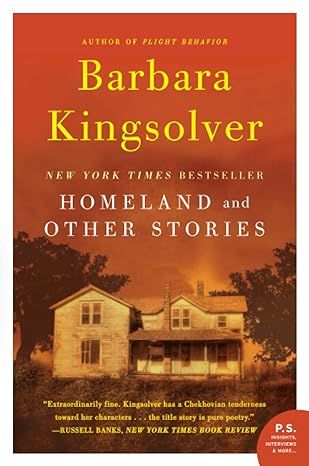
Homeland: And Other Stories
4.2
-
691
$5.24
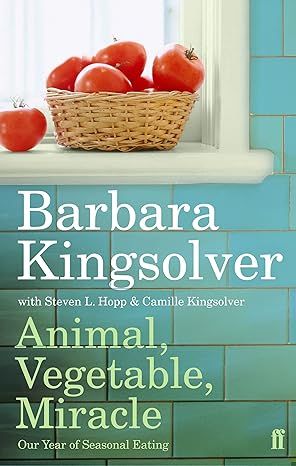
Animal, Vegetable, Miracle: Our Year of Seasonal Eating
4.5
-
2,496
$7.96
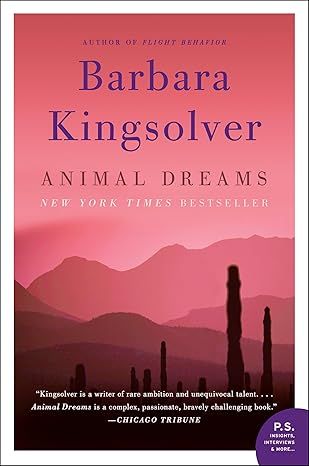
Animal Dreams: A Novel
4.4
-
2,888
$10.49
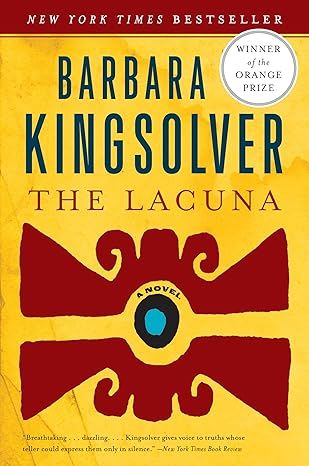
The Lacuna: A Novel (P.S.)
4.4
-
4,450
$1.77
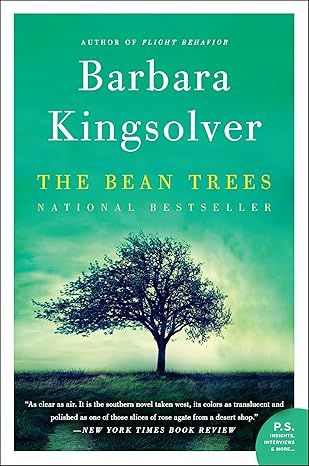
The Bean Trees Anniversary Edition: A Novel
4.4
-
11,504
$2.41
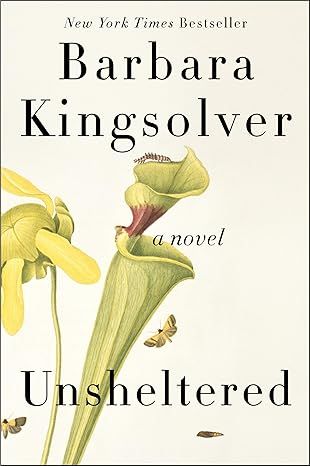
Unsheltered: A Novel
4.2
-
12,750
$5.24
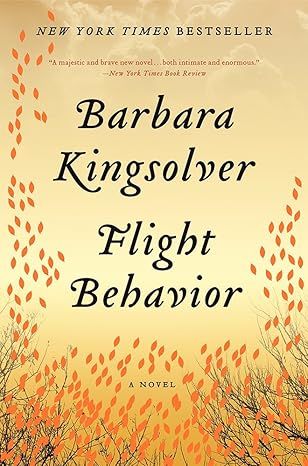
Flight Behavior: A Novel
4.3
-
9,479
$1.84
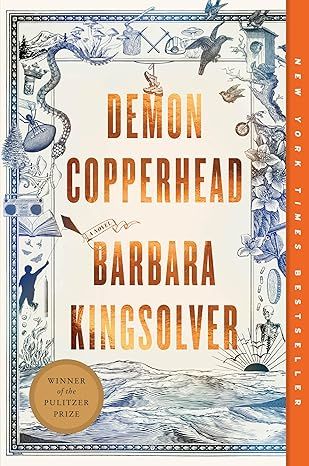
Demon Copperhead: A Novel
4.6
-
110,129
$16.99
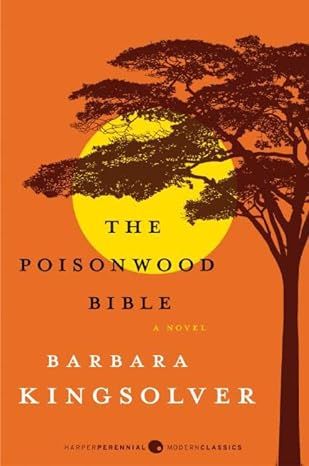
The Poisonwood Bible: A Novel
4.5
-
16,256
$12.69
Best Sellers

The Tuscan Child
4.2
-
100,022
$8.39

The Thursday Murder Club: A Novel (A Thursday Murder Club Mystery)
4.3
-
155,575
$6.33

Sapiens: A Brief History of Humankind
4.6
-
140,302
$13.49

The Butterfly Garden (The Collector, 1)
4.3
-
88,556
$9.59

Things We Hide from the Light (Knockemout Series, 2)
4.4
-
94,890
$11.66

The Last Thing He Told Me: A Novel
4.3
-
154,085
$2.99

The Perfect Marriage: A Completely Gripping Psychological Suspense
4.3
-
143,196
$9.47

The Coworker
4.1
-
80,003
$13.48

First Lie Wins: A Novel (Random House Large Print)
4.3
-
54,062
$14.99

Mile High (Windy City Series Book 1)
4.4
-
59,745
$16.19

Layla
4.2
-
107,613
$8.99

The Locked Door
4.4
-
94,673
$8.53
